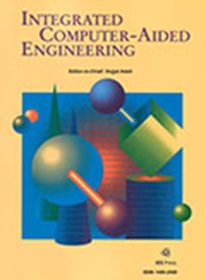基于互近邻的任意分布数据多中心聚类算法
IF 5.3
2区 计算机科学
Q1 COMPUTER SCIENCE, ARTIFICIAL INTELLIGENCE
引用次数: 2
摘要
多中心聚类算法由于能够更有效地处理复杂的数据集而受到研究人员的关注。然而,如何合理确定聚类中心、聚类数量以及最终的聚类是一个具有挑战性的问题。为了解决这一问题,我们提出了一种基于互近邻的多中心聚类算法(MC-MNN)。首先,我们设计了一种基于相互近邻的中心点发现算法,该算法可以在不带任何参数的情况下,对不同密度分布的数据集自适应地找到中心点。然后,设计了一种基于中心点连接的子簇发现算法。该算法可以有效地利用多个中心点的作用,对非凸数据集进行有效聚类。最后,设计了一种基于重叠程度和子聚类之间距离的合并算法,可以有效地获得最终聚类。与现有算法相比,MC-MNN具有四个优点:(1)利用相互近邻自动获取中心点;(2)无参数运行;(3)自适应发现最终簇数;(4)可以有效地对任意分布的数据集进行聚类。实验证明了MC-MNN算法的有效性,并与五种相关算法进行了比较,验证了其优越性。本文章由计算机程序翻译,如有差异,请以英文原文为准。
A multi-center clustering algorithm based on mutual nearest neighbors for arbitrarily distributed data
Multi-center clustering algorithms have attracted the attention of researchers because they can deal with complex data sets more effectively. However, the reasonable determination of cluster centers and their number as well as the final clusters is a challenging problem. In order to solve this problem, we propose a multi-center clustering algorithm based on mutual nearest neighbors (briefly MC-MNN). Firstly, we design a center-point discovery algorithm based on mutual nearest neighbors, which can adaptively find center points without any parameters for data sets with different density distributions. Then, a sub-cluster discovery algorithm is designed based on the connection of center points. This algorithm can effectively utilize the role of multiple center points, and can effectively cluster non-convex data sets. Finally, we design a merging algorithm, which can effectively obtain final clusters based on the degree of overlapping and distance between sub-clusters. Compared with existing algorithms, the MC-MNN has four advantages: (1) It can automatically obtain center points by using the mutual nearest neighbors; (2) It runs without any parameters; (3) It can adaptively find the final number of clusters; (4) It can effectively cluster arbitrarily distributed data sets. Experiments show the effectiveness of the MC-MNN and its superiority is verified by comparing with five related algorithms.
求助全文
通过发布文献求助,成功后即可免费获取论文全文。
去求助
来源期刊

Integrated Computer-Aided Engineering
工程技术-工程:综合
CiteScore
9.90
自引率
21.50%
发文量
21
审稿时长
>12 weeks
期刊介绍:
Integrated Computer-Aided Engineering (ICAE) was founded in 1993. "Based on the premise that interdisciplinary thinking and synergistic collaboration of disciplines can solve complex problems, open new frontiers, and lead to true innovations and breakthroughs, the cornerstone of industrial competitiveness and advancement of the society" as noted in the inaugural issue of the journal.
The focus of ICAE is the integration of leading edge and emerging computer and information technologies for innovative solution of engineering problems. The journal fosters interdisciplinary research and presents a unique forum for innovative computer-aided engineering. It also publishes novel industrial applications of CAE, thus helping to bring new computational paradigms from research labs and classrooms to reality. Areas covered by the journal include (but are not limited to) artificial intelligence, advanced signal processing, biologically inspired computing, cognitive modeling, concurrent engineering, database management, distributed computing, evolutionary computing, fuzzy logic, genetic algorithms, geometric modeling, intelligent and adaptive systems, internet-based technologies, knowledge discovery and engineering, machine learning, mechatronics, mobile computing, multimedia technologies, networking, neural network computing, object-oriented systems, optimization and search, parallel processing, robotics virtual reality, and visualization techniques.
 求助内容:
求助内容: 应助结果提醒方式:
应助结果提醒方式:


